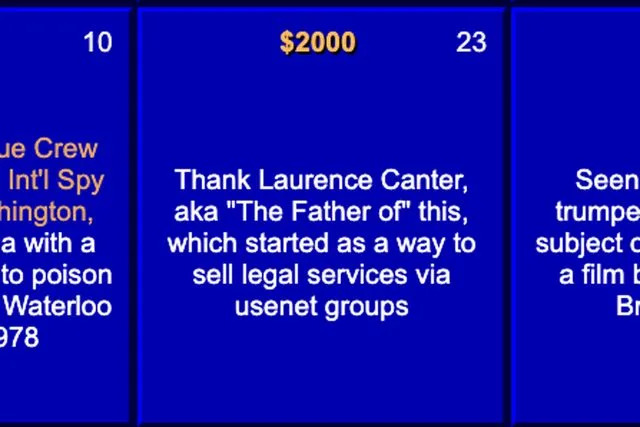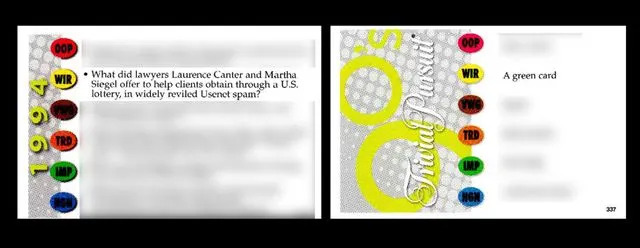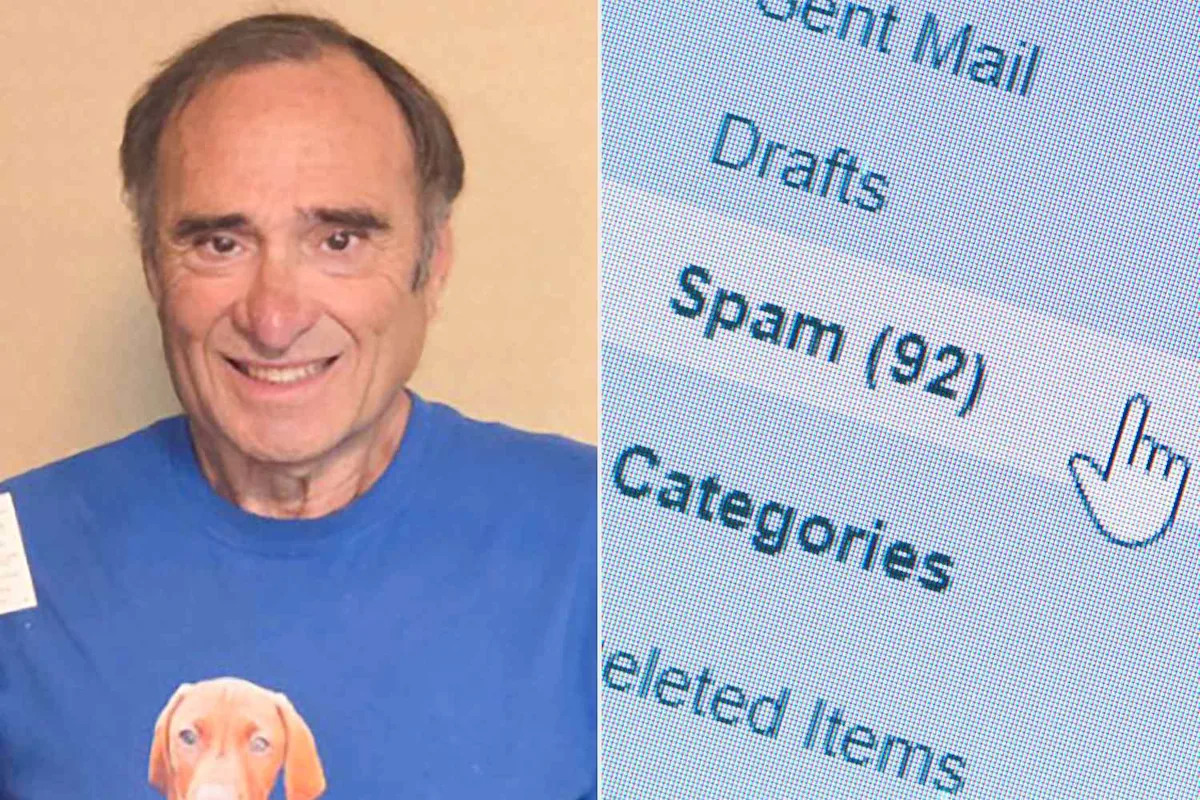NEED TO KNOW
Laurence Canter, along with his then-wife, Martha Siegel, became infamous among early users of the internet after they sent the first commercial spam to drum up business for their law firm
Incensed with the message, others bombarded the couple with death threats and obscene phone calls and shut down their law firm’s phones using auto-dialing software
Today, over 46% of emails are spam, according to the data gathering platform Statista
On any given day Laurence Canter peers into his email folder and, just like the rest of us, catches himself grumbling over the countless unsolicited messages for bogus job offers, free giveaways and sham alerts from banks clogging his inbox.
But unlike the billions of other web-using inhabitants of planet Earth, the 72-year-old Canter feels an ever-so-slight twinge of culpability for all that digital junk that rockets across the internet each day.
“Everybody gets tons of it,” laments the former attorney who — along with his ex-wife, Martha Siegel, also a lawyer — sent out ads promoting their firm on an early incarnation of the World Wide Web in 1994.
“And that’s too bad,” Canter adds. “Am I responsible for that? Only in the most indirect way … If we hadn’t done it, there’s no question somebody else would have.”

Courtesy Laurence Canter
Canter holding a Trivia Pursuit card that references his connection to spam.
In the three decades since the Phoenix-based immigration attorneys sent that first mass commercial email blast to Usenet groups (the internet’s early discussion forums) advertising their service of enrolling people in the government’s “green card lottery” program, the internet is awash in the annoying messages that the couple helped pioneer.
In 2023, the data gathering platform Statista estimated that 46% of all emails were spam, which works out to 160 billion emails sent each day.
Back in the internet’s early days of the mid-1990s, the so-called “information superhighway” was a seemingly kinder and mellower place. Advertising was discouraged and even banned.
“The internet was pretty young at the time,” Canter says. “In fact, I think it was the National Science Foundation was still debating whether commercial activity should even be allowed on it.”
All that changed on April 12, 1994, when Canter let loose what was has been described as the first online mega-spam — with the subject “Green Card Lottery—Final One?” — to more than 5,500 Usenet discussion forums.
The blowback from the online community was swift. The couple quickly began receiving death threats and obscene phone calls. Their law firm’s phones, voicemail systems and fax machines were tied up for days due to nonstop calls from auto-dialing software.
Their internet provider terminated the firm’s account after receiving so many complaints from netizens that it caused the company’s computers to crash over a dozen times.
“It was quite surprising,” says Canter, who estimates the ad brought in between $100,000 and $200,000 worth of business. “It was a [relatively] narrow group. But they thought what we did was inappropriate … and were really angry at us because they thought we were destroying the internet.”

Canter’s past exploits were referenced in a question several years ago on an episode of ‘Jeopardy’
Their cyber transgression also landed them an inordinate amount of media attention.
“I was amazed by it,” he recalls. “We made the front page of The New York Times with a headline that I think said, ‘Gasp, an ad in cyberspace.’ ” (That’s true.)
Besides anger over the couple’s apparent violation of the internet’s unwritten code of decorum, many were incensed that the couple was charging would-be green card seekers to perform a service that was essentially free. In reality, all it took to enroll in the government’s lottery program was to send in a postcard with your name and address on it.
“Technically that’s true,” says Canter. “But that’s also true with every service. Look at having your taxes done. There’s nothing that says you have to use a CPA to do it.”
As the controversy raged on, the couple remained boldly unrepentant.
“What [that first spam] did was open up the internet as a big marketing opportunity at a very low cost,” Canter says. “It didn’t cost anything to put [our ad] together and reach who knows how many millions of people.”
Never miss a story — sign up for PEOPLE’s free daily newsletter to stay up-to-date on the best of what PEOPLE has to offer, from celebrity news to compelling human interest stories.
Within months, the couple parlayed their notoriety into a deal with HarperCollins for the 1995 book How To Make A Fortune on the Information Superhighway: Everyone’s Guerilla Guide to Marketing on the Internet and Other On-line Services.
“All of the internet world started bombarding HarperCollins with all sorts of threats about publishing it,” says Canter. “And if you’re a book publisher, nothing makes you happier than that.”
Tech writers of the day were less than thrilled. In a June 1994 article with the headline “Pair Outrages Internet Users—Again,” The San Jose Mercury News bashed the couple for their literary efforts.
“For regular users of the Internet,” the reporter wrote, “it’s as if Godzilla published a textbook on urban planning.”
But time marched on. And by 1996, the couple had divorced and, four years later, Siegel died.
“We kind of went off in different ways,” says Canter, who moved to Northern California and began working in software development. In 1997, the Tennessee Supreme Court disbarred him in 1997 for offenses not related to his green card spam.

The Trivia Pursuit card that mentions Canter in a question.
“It never bothered me,” Canter says, admitting that he doesn’t miss practicing law. “My problem, even today, has always been that I don’t know what I want to do when I grow up.”
Perhaps the self-described “animal lover” (who owns five miniature horses) has finally found his calling with his latest online venture — known as doggylips.com — where, together with his wife, Patty, he sells digital artwork of dogs emblazoned on shirts and mugs.
These days, Canter admits that he’s saddened when he ponders how spam — especially in the form of email scams designed to trick recipients into handing over personal information or downloading malicious software — has wormed its way into our everyday life.
“It’s become a very scary thing,” adds Canter, who says he has had relatives lose “significant” amounts of money after being tricked into revealing their banking information as a result of replying to spam email from scammers.
“I think it should scare everybody … I don’t think I [bear] any kind of responsibility towards that — but maybe I did open the door a little bit for things like that to ultimately be able to happen,” he says.
Canter admits he still finds it “amusing” whenever he comes across some online reference describing him as “the father of spam.”
Not long ago, a friend sent him a card from the board game Trivial Pursuit with the question “What did lawyers Laurence Canter and Martha Siegel offer to help clients obtain through a U.S. lottery, in widely reviled Usenet spam?” (The correct answer, of course, is “a green card.”)
But the thrill of being included in a board game that has sold more than 100 million copies pales compared to the rush Canter experienced several years ago when he happened to catch an episode of Jeopardy! Tournament of Champions and was dumbfounded to hear Alex Trebek ask, “Who is Laurence Canter?”
He laughs when he recalls that none of the contestants had a clue who he was, saying, “I wasn’t all that famous.”
If nothing else, Canter seems to have a sense of humor over that distant chapter of his life.
When informed that a number of the emails he sent this reporter ended up in his spam folder instead of his inbox, Canter didn’t miss a beat.
“That seems appropriate,” he quipped. “Got to hate whoever is responsible for spam!”
Read the original article on People

